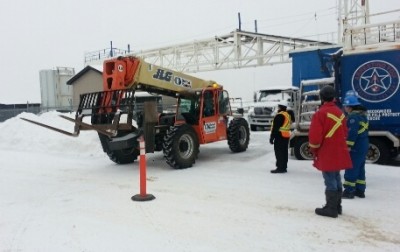When it comes to mobile equipment training, there are several attributes that will help trainers effectively provide instruction and ensure understanding. Let’s take a look at some of the most important ones: knowledge, communication, organizational skills, integrity and people skills.
 Knowledge. Trainers shouldn’t even consider training anyone until they themselves have an advanced knowledge level of the topic. Trainers need to know the operational theory and also any rules and regulations related to the equipment involved. In particular, they should be aware of any operator training standards and requirements for its safe use that are incorporated by regulatory reference as well as any site/company policies and procedures. Trainers must also have a solid knowledge of the inspection and use of the specific machine involved and the application for which it is used at the location where the operators use it.
Knowledge. Trainers shouldn’t even consider training anyone until they themselves have an advanced knowledge level of the topic. Trainers need to know the operational theory and also any rules and regulations related to the equipment involved. In particular, they should be aware of any operator training standards and requirements for its safe use that are incorporated by regulatory reference as well as any site/company policies and procedures. Trainers must also have a solid knowledge of the inspection and use of the specific machine involved and the application for which it is used at the location where the operators use it.
Ability to communicate. All the knowledge in the world won’t mean a thing if the trainer is not able to effectively communicate it to others. The ability to communicate successfully is often overlooked when selecting individuals as trainers. Instead, individuals with years of operating experience are chosen. While there is no argument that the best trainers are those with the right mix of operational experience and communication skills, if one had to choose between the two, the latter would be my choice. Operating machinery and training operators involves two completely different skill sets, each one having very little to do with the other.
Organizational skills. Failing to plan is planning to fail. I have been training operators and trainers for nearly 20 years and I still have my lesson plan with me for every class. I believe that following a comprehensive plan is what separates a great trainer from the rest of the pack. Working from a plan offers many benefits, like:
-
- Consistency and accuracy. Trainers can be assured that using a lesson plan will ensure the level and quality of information taught will remain constant. For organizations that utilize more than one trainer, this consistency is carried between them to the point where one could take over for the other mid-stream and not miss a beat.
- Focus and direction. Occasionally a trainer can come away from a given topic in order to draw an analogy or make a point. Without a written plan a trainer may become unsure of where things left off and become lost. Referring to a lesson plan provides instant grounding and orientation to help get back on track quickly.
- Pacing and use of time. Using a lesson plan provides trainers with veritable checklist that can be used to adjust the pace of the training as required, allowing them to use their time most effectively. For example, a trainer may be able to determine that they are behind schedule simply by looking at their plan and adjust the pace and/or content of the program accordingly.
Interest and integrity. If you want others to be interested in what you’re saying, you should be interested in what you’re saying. Trainers need to believe that what they are doing is the right thing to do. In fact, they should be downright passionate about it. If a trainer is going to get up in front of a group and just pay lip service to the issue then they can expect the same level of buy-in and commitment from their trainees. If you don’t believe in what you’re doing, do yourself and everybody else a favor and don’t do it at all.
People skills. It’s not just a certain type of person that makes the best trainer, it’s a certain type of personality. A trainer should be empathetic, approachable, friendly, perceptive, observative, adaptable, and very patient.
In closing, good equipment operator trainers have the right mix of knowledge, communication, organizational and people skills along with a genuine interest and desire to effectively communicate what to do, how to do it and why it must be done. If this is happening then it’s a job well done but if it’s not, then it’s just a job.
Rob Vetter
Director of Training
IVES Training Group
Did you enjoy this article? Sign up for our newsletter to receive more like this!